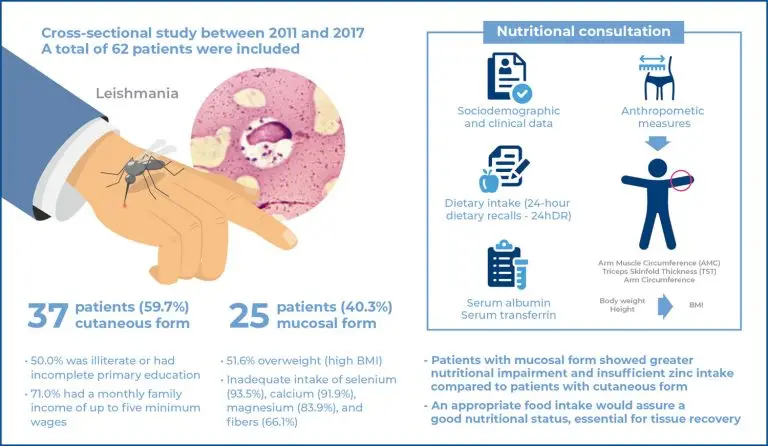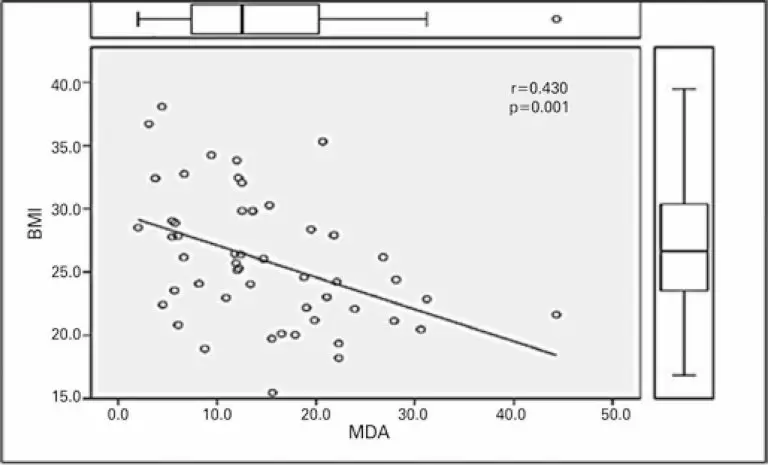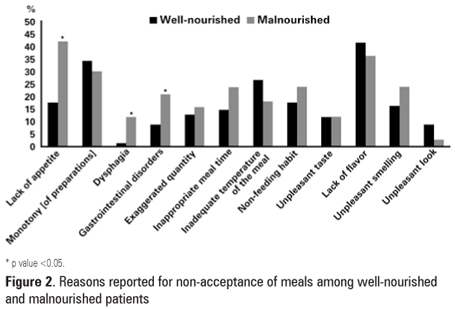17/Feb/2025
Adequacy of nutritional status and dietary intake of adult and elderly patients with American Tegumentary Leishmaniasis
einstein (São Paulo). 17/Feb/2025;23:eAO0992.
View Article17/Feb/2025
Adequacy of nutritional status and dietary intake of adult and elderly patients with American Tegumentary Leishmaniasis
DOI: 10.31744/einstein_journal/2025AO0992
Highlights ■ Most patients had an inadequate intake of selenium, calcium, magnesium, and fiber. ■ Patients with mucosal had lower body weight, arm muscle circumference, and serum albumin and zinc intake. ■ Mucosal is associated with insufficient zinc intake, low body weight, and the depletion of serum albumin and transferrin. ■ Oropharyngeal lesions are associated with calorie malnutrition and serum protein depletion. ABSTRACT Objective: Patients with American Tegumentary Leishmaniasis often experience malnutrition, weight loss, and dehydration; however, their eating profile […]
Keywords: Communicable diseases; Eating; Leishmaniasis, cutaneous; Malnutrition; Nutritional assessment; Wound healing
06/May/2022
Degree of food processing and association with overweight and abdominal obesity in adolescents
einstein (São Paulo). 06/May/2022;20:eAO6619.
View Article06/May/2022
Degree of food processing and association with overweight and abdominal obesity in adolescents
DOI: 10.31744/einstein_journal/2022AO6619
ABSTRACT Objective To evaluate the association between the degree of food processing, overweight, and abdominal obesity in adolescents. Methods This is a cross-sectional study, with 576 adolescents aged 10 to 17 years, of both sexes. Food consumption was collected using the Food Frequency Questionnaire and foods classified as in natura or minimally processed, processed foods associated with culinary ingredients, and ultraprocessed foods. Sociodemographic data, body mass index, waist circumference and waist-to-height ratio were collected. The analysis was evaluated by the […]
Keywords: Adolescent; Eating; Industrialized foods; Obesity, abdominal; Overweight
09/Dec/2019
Correlation between nutritional assessment and oxidative stress in candidates for liver transplant
einstein (São Paulo). 09/Dec/2019;18:eAO4039.
View Article09/Dec/2019
Correlation between nutritional assessment and oxidative stress in candidates for liver transplant
DOI: 10.31744/einstein_journal/2020AO4039
ABSTRACT Objective To evaluate the oxidative profile, nutritional status and food intake (caloric value; macronutrients; vitamins A, E and C; and zinc), and to correlate oxidative stress with nutritional status in patients who were candidates for liver transplant. Methods This is a cross-sectional, analytical, and descriptive study with 51 candidates for liver transplant. Sociodemographic and clinical data, anthropometric parameters, food consumption, and a 10mL blood sample were collected from each patient. Oxidative stress was analyzed by the thiobarbituric acid method. […]
Keywords: Antioxidants; Eating; Liver cirrhosis; Nutrition assessment; Oxidative stress
21/Nov/2018
Clinical, dietary and demographic characteristics interfering on quality of life of cancer patients
DOI: 10.31744/einstein_journal/2018AO4368
ABSTRACT Objective To estimate the dietary intake of cancer patients and its relation with clinical and demographic characteristics, and to assess the contribution of dietary intake, appetite/symptoms and clinical and demographic characteristics to their quality of life. Methods The consumption of energy and macronutrients of patients was estimated. The relation between dietary intake and clinical and demographic characteristics was evaluated by analysis of variance. The intake of energy and macronutrient of the patients was compared to the nutritional recommendations using […]
Keywords: Dietetics; Eating; Neoplasms; Quality of life
09/Apr/2013
Acceptance of hospital diets and nutritional status among inpatients with cancer
einstein (São Paulo). 09/Apr/2013;11(1):41-6.
View Article09/Apr/2013
Acceptance of hospital diets and nutritional status among inpatients with cancer
DOI: 10.1590/S1679-45082013000100008
OBJECTIVE: To verify acceptance of hospital diets as to the nutritional status among patients admitted to the Oncology/Hematology Unit of a tertiary care hospital. METHODS: A cross-sectional study conducted among 100 patients, aged >18 years, of both genders. Body mass index and subjective global nutritional evaluation by patients were used to detect the nutritional status. The rest-ingestion index was used to evaluate diet acceptance, and the reasons for non-acceptance were identified by means of a questionnaire. Data were expressed in […]
Keywords: Diet; Eating; Neoplasms; Nutritional assessment; Nutritional status




